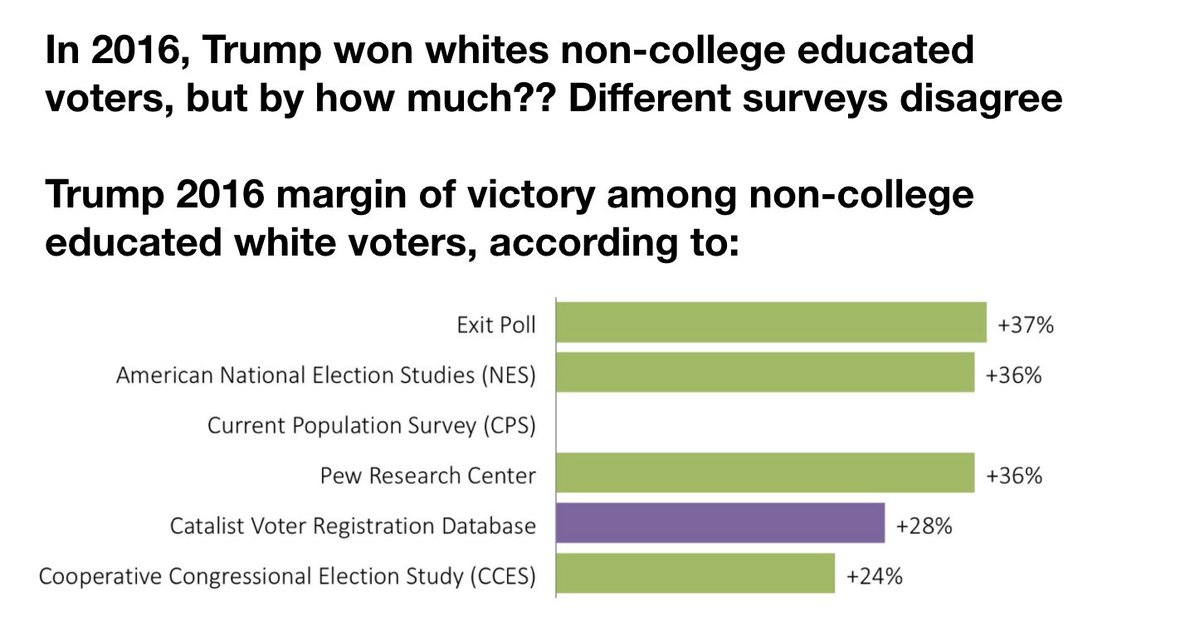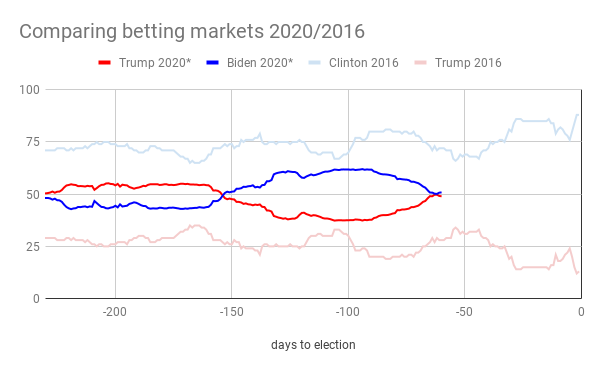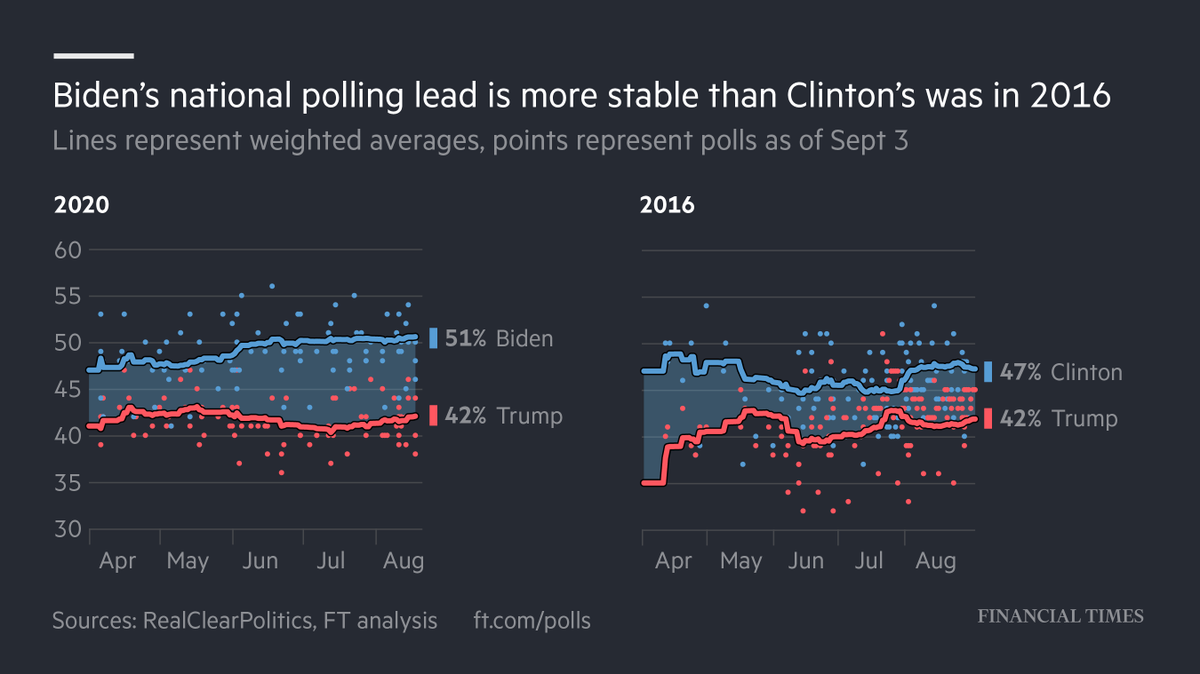
HOW DID AMERICANS VOTE/SHIFT FROM 2016? It's tempting to just compare 2020 exit polls to 16's to unpack voting patterns, but that's problematic.
Our @FT story explains why & uses exits AND other sources to paint a preliminary picture of trends: (THREAD)
ft.com/content/69f320…
Our @FT story explains why & uses exits AND other sources to paint a preliminary picture of trends: (THREAD)
ft.com/content/69f320…
0/ TLDR: Here's our summary #dataviz that shows the shifts, because my time in journalism has taught me not to bury the lede 🤓
But hey, it's my twitter thread so I'm gonna answer the "How did you get these numbers?" Qs that @jburnmurdoch & I grappled with *A LOT*
But hey, it's my twitter thread so I'm gonna answer the "How did you get these numbers?" Qs that @jburnmurdoch & I grappled with *A LOT*

1/ In order to (responsibly) make statements like "___ voters moved away from Biden" and "___ voters shifted toward Trump" since '16 where ___ is a demographic, you need to know:
(a) How this demographic voted in '16
(b) How this demographic voted in '20
Simple, right? No.
(a) How this demographic voted in '16
(b) How this demographic voted in '20
Simple, right? No.
2/ For example, the answer to the deceptively simple-sounding Q "How did Biden do with Black voters in 2020?" depends on the source you use for (a) Black vote in '16 and the source you use for (b) Black vote in '20.
If we just change up (b) we get 3 different stories:
If we just change up (b) we get 3 different stories:

3/ But let's start with 2016. You might think 4 yrs later we have a perfect understanding of who voted & how, but you'd be wrong
Yes, we have the '16 exits but the exit pollster overhauled its methodology in '18 in part bc it undercounted low-educ voters edisonresearch.com/national-elect…
Yes, we have the '16 exits but the exit pollster overhauled its methodology in '18 in part bc it undercounted low-educ voters edisonresearch.com/national-elect…

4/ Great summary and analysis of the problems with 2016 exit polls by @Edsall nytimes.com/2018/03/29/opi…
So let's agree 2016 exit polls are not great. Even Edison Research (the firm that does them) agrees to some extent bc like I said they changed their methods.
So let's agree 2016 exit polls are not great. Even Edison Research (the firm that does them) agrees to some extent bc like I said they changed their methods.
5/ So using 2016 exit polls as a baseline is problematic. BUT it has been 4 yrs so there's been extensive research of '16 electorate including the ANES @electionstudies, the CES ht @b_schaffner, @pewresearch validated voters data, this @amprog study
americanprogress.org/issues/democra…
americanprogress.org/issues/democra…

6/ Not to mention the Election Eve surveys in 2016 by @AAPIDecisions @AfAmResearch @LatinoDecisions
specifically conducted to get a representative sample of voters of color. This year the 3 grps came together to jointly carry out a 2020 Election Eve Poll
electioneve2020.com
specifically conducted to get a representative sample of voters of color. This year the 3 grps came together to jointly carry out a 2020 Election Eve Poll
electioneve2020.com
7/ These surveys don't all agree, meaning just to answer "What happened in 2016" is a task in and of itself, *four years later*
Another reading rec: @yghitza's Medium post, feat this excellent graphic (headings added):
medium.com/@yghitza_48326… HT @jon_m_rob
Another reading rec: @yghitza's Medium post, feat this excellent graphic (headings added):
medium.com/@yghitza_48326… HT @jon_m_rob

8/ So to come up with our 2016 baseline, we took an average of all of those sources to get the %Trump & %Clinton by different demographics. It's not perfect, but we think we included a good mix of surveys, and we did a robustness check (more on that later)
Now let's get to 2020:
Now let's get to 2020:
9/ In 2020, the exit polls changed/corrected their methods. Note state polls did something similar & I wrote a nerdy story & nerdy thread on that as well 😅 ... (what happened with polls in 2020 is a whole different tangent )
https://twitter.com/christinezhang/status/1301925507139809280
10/ For that reason, we can *maybe* place more trust in the 2020 exit polls, even if we can't reliably compare them to the 2016 exit polls. BUT because nothing is easy and 2020 is 2020, there are at least couple of complications.
First, the pandemic: cnn.com/2020/11/02/pol…
First, the pandemic: cnn.com/2020/11/02/pol…
11/ The pandemic means the age-old "person stands outside of a polling place & asks people how they voted" exit poll is now done from 6ft away AND — this is important — now also has to be supplemented by phone surveys & exit interviews at early voting centers
12/ To Edison's credit, their 2018 methodology change to the exit polls did take the early voting increase into account (recall that even without the pandemic, more and more Americans were voting early/absentee)
edisonresearch.com/national-elect…
edisonresearch.com/national-elect…

13/ But as @laurabronner convincingly argues in this video, does this make the exit polls this year any better than a pre-election survey conducted during the final week of the election? Maybe not.
fivethirtyeight.com/videos/be-wary…
fivethirtyeight.com/videos/be-wary…
14/ @laurabronner mentions that in the past one main advantage of exit polls over some pre-election surveys was that with exit polls, you definitely *know* the person you've interviewed has voted because they literally just came out of the voting center
fivethirtyeight.com/videos/be-wary…
fivethirtyeight.com/videos/be-wary…
15/ whereas people can lie on surveys. It's not a good look to say you didn't vote, so there's plenty of evidence that people who didn't vote say they did because they want to appear more civically-engaged. Here's an older study but point still holds
pewresearch.org/fact-tank/2016…
pewresearch.org/fact-tank/2016…
16/ The CES, @Catalist_US, @pewresearch & others do voter validation on post-election surveys and datasets by cross-checking voter lists etc. But that can take a while.
Eg Pew's voter-validated demographic profiles for 2018 came out in Sep *this year*
pewresearch.org/methods/2020/0…
Eg Pew's voter-validated demographic profiles for 2018 came out in Sep *this year*
pewresearch.org/methods/2020/0…
17/ But if exit polls are supplementing their in-person exits with phone surveys (which keep in mind they have never before done during presidential election) they face the same issue as telephone & online surveys & so it might be a wash as to who is better in the end
18/ Oh yeah, and BTW exit polls are reweighted to final vote tallies which are still being ... finalized so the numbers you see today might yet change. This was less of an issue in the past bc states didn't have so many mail votes to count
https://twitter.com/rp_griffin/status/1324017510438588416
19/ Second complication is that the AP and Fox News left the National Election Pool, the consortium of ABC/CBS/CNN/NBC (and formerly AP+Fox) that co-sponsor the exit polls
Prescient story by
politico.com/story/2019/05/… by @POLITICO_Steve
Prescient story by
politico.com/story/2019/05/… by @POLITICO_Steve
20/ (if ur wondering why AP+Fox called Arizona & others didn't that's also part of the reason) ...
Anyway, AP + FoxNews + NPR etc. are using a new survey called AP VoteCast that debuted in 2018 that kind of works like a large-scale phone+online poll
npr.org/2020/11/03/929…
Anyway, AP + FoxNews + NPR etc. are using a new survey called AP VoteCast that debuted in 2018 that kind of works like a large-scale phone+online poll
npr.org/2020/11/03/929…
21/ TLDR here's the methodology box from our story that summarizes these issues and datasets (for 2020 we avged exit polls, Election Eve polls, AP VoteCast)
ft.com/content/69f320…
ft.com/content/69f320…

22/ FINALLY, some takeaways on the shifts:
> Trump's losses w/white, v slight gains w/non-white
> Latino shifts right/returned to pre-Obama trend (grps!=monoliths, chg rapidly w/immigration etc)
> Trump gains w/$100k+
> Gender gap actually closed a bit bc more men moved to Biden
> Trump's losses w/white, v slight gains w/non-white
> Latino shifts right/returned to pre-Obama trend (grps!=monoliths, chg rapidly w/immigration etc)
> Trump gains w/$100k+
> Gender gap actually closed a bit bc more men moved to Biden

23/ Robustness check: what if we exclude the Edison exit polls? White college women move further left, $100K+ chgs more slight, others trends hold
STORY:
ft.com/content/69f320… by @jburnmurdoch & me HT @BillyEhrenberg, edited by @AdrienneKlasa ⚡️
PS all our code was #rstats 🤓
STORY:
ft.com/content/69f320… by @jburnmurdoch & me HT @BillyEhrenberg, edited by @AdrienneKlasa ⚡️
PS all our code was #rstats 🤓

• • •
Missing some Tweet in this thread? You can try to
force a refresh




